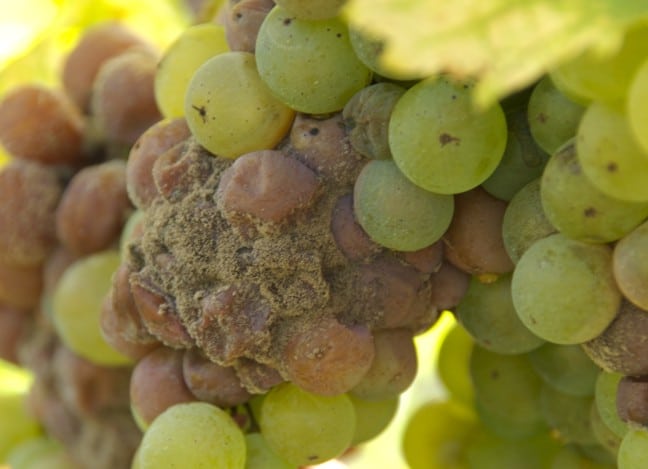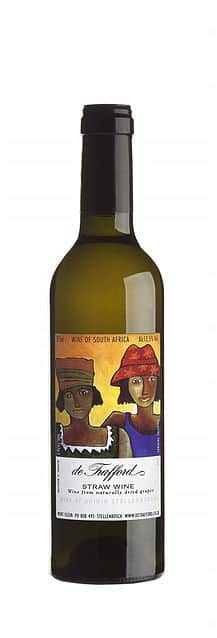Tim James: On sweet wine
By Tim James, 6 August 2018

13
Gottfried Mocke (reinventor of Chamonix as a fine wine producer and now winemaker at Boekenhoutskloof) last week presented his Cape Winemakers Guild colleagues and a few privileged guest with a splendid tasting of sweet, botrytised wines from around the world – well, France, Germany and Hungary, anyway. Apart from my enjoying some excellent wines, and good conversation and dinner at Foliage in Franschhoek (probably my favourite restaurant), the experience got me thinking about the Cape’s sweet wines. That’s something I confess I don’t often do. Even less often do I buy any….
There’s little point in lyrically reporting at length on Gottfried’s tasting, but I’d like to say a bit. Via a relevant story. The first time I tasted a Trockenbeerenauslese riesling, the sweetest and most botrytised category in German wine, was many years ago at a fine Saar estate called Schloss Saarstein. It’s pinioned to my memory. I was lucky that my visit coincided with one by their American importer, so I tasted the best – including that maiden TBA, which devastated me with its pure-fruited, thrilling balance of sweetness and acidity. The American remarked to me, and I could only dumbly agree, that the great German sweet wines make even the finest Sauternes seem just that little bit clumsy….
So it was this evening. There were three good Sauternes, of which the Château d’Yquem 2005 was the grandest but not the best in my opinion (I’ve had this vintage before and it was not really impressive then either). To mention some of the others that I most admired: there was a very fine, pure, bright Oremus 6 Puttonyos Tokaji, also 2005; three Mosel Auslesen (including a suberb Clemens Busch Marienburg Falkenlay 2015), a lovely, elegant Dr Loosen Beerenauslese, and two TBAs, of which the better was a marvellous Peter Lauer 2009 from the great Saar vineyard Ayler Kupp. To give an idea of the devotion and fanaticism that is generally needed to produce such wines (rewarded by huge prices from mostly fanatical German buyers), let me tell you the total volume produced of this 2009 wine: 47 litres. No digits missing there, just those two. A moderate demijohnful.
Gottfried, being the soul of modesty, didn’t include the Boekenhoutskloof Noble Late Harvest, which is arguably the most Sauternes-like of local botrytised wines. The Cape’s botrytis-wine-producers do not always follow that model: from semillon and sauvignon, with highish alcohol, new-oak maturation, moderate sweetness. The German tradition here is strong, and that is reflected in many of the dessert wines: lower alcohol and higher sugars, little or no oaking, generally from riesling. And in fact there are permutations and variations of those two basic styles. (Many years ago, Jean-Vincent Ridon did produce some wines more oriented to Tokaji, including an Esszencia, but that was an isolated example.)
Local climatic patterns are not generally conducive to ‘noble rot’, however, which thrives in misty autumn dampness broken by warm sunshine. The Boekenhoutskloof semillon vineyard comes closer than many, in fact: low-lying alongside a stream, with a high water table. But the hot, dry conditions widely prevailing in recent years have been unkind to many producers of botrytised wines, and I suspect we can expect lower volumes on the shelves.
It’s generally a category of Cape wine that has not exactly been thriving. (How much do you buy?) A fairly substantial number of Noble Late Harvests are listed in Platter – around 70 – but it has been static for the past decade. On the other hand, vins de paille, straw wines, are on the up. Surprisingly, despite the Cape climate being obviously better attuned to producing raisined sweet wines rather than nobly rotten ones (going all the way back to the great old Constantias, after all), the first modern straw wine was the De Trafford 1997. There was no official category for it until David Trafford started lobbying, so earlier efforts could not be certified. Within ten years there were a dozen examples, and the current Platter lists 43.
The fact that botrytised wines had come to occupy the place that the climate suggests should have been taken by raisined ones has everything to do with the historical prestige of German-style winemaking here – and, specifically, the background of Günter Brözel, creator of Nederburg Edelkeur. But that and the story of how long it took for the ruling KWV to allow any sweet wine that wasn’t fortified are bits of history that must be taken up on another occasion.
- Tim James is one of South Africa’s leading wine commentators, contributing to various local and international wine publications. He is a taster (and associate editor) for Platter’s. His book Wines of South Africa – Tradition and Revolution appeared in 2013.









thandie hadebe | 13 August 2018
Morning spittoon.
Indeed all wine writers will have friends in the wine industry , but do they then include such friends in every single article ? I remember the printed version of winemag in the 90’s , back then Beyers Truter and Gyles Webb was all the rage , but i cant recall ever that a journo will include them in every single article. Just doesnt feel right.
P.s. spitty didnt u mention your seeking an opportunity in the Cape wine wine industry – there is a book here – THE CRUSH , EBEN SADIE , A SWARTLAND LOVE STORY – u and Tim can have a bestseller here , even a movie deal. Spitty enjoy , got to fly .
Kwispedoor | 13 August 2018
Thandie, you say “every single article” a lot. Either you don’t really understand what that means or you need to re-read all Tim’s articles. Sure, Tim mentions Eben often in his articles, but I think some people have a far bigger obsession with Tim mentioning Eben than Tim has with Eben. And it’s a really big yawn, to be frank. And you haven’t answered my question: do you prefer that the new owners prescribe to the writers what and how they should write? Or maybe you have another practical move in mind? Perhaps Christian can launch a poll on readers’ preference, or not, for direction and censorship from the new owners.
.
thandie hadebe | 10 August 2018
Agree agree. Just had the columella 16 , great wine , way to early though , but have some hidden from hubby.
Tim yes the man crush is strong , shame , pofadder etc.
New owners , do they also allow free ‘friend’ marketing ?
Kwispedoor | 11 August 2018
Sadie doesn’t exactly need the marketing. And all the writers for this blog has friends in the industry. Do you prefer that the new owners prescribe to the writers what and how they should write?
vines | 7 August 2018
The smirries , boers etc , yes im a big fan of eben sadie’s wines , have plenty in my collection.
Was just curios why james didnt include sadie in article , he always , always does.
Hopefully new owners though will rectify this kind of behavior , just plain boring
Kwispedoor | 7 August 2018
I don’t think I have ever found anything that Tim James wrote on the subject of wine boring. And if the new owners start to sensor the writers, I’d be one of the first to lose interest. They all have their own styles and sanitising their work would be a shame. Each to his own, I say!
Kwispedoor | 7 August 2018
What I mean by “each to his own” is rather sensor the reading than the writing.
Kevin R | 7 August 2018
I think it’s boring to hear about the old school producers making classic wines because that’s all we’ve known for far too long… and with what result for South African wine overall? Pioneers like Eben are exactly the reason that South Africa is now considered one of the most exciting wine regions in the world.
Smirrie | 7 August 2018
Hi Vines
I will slip in the name of Eben Sadie. If you ever has the chance try and source his 2011 Eselshoek Old Vine Series Muscat d’Alexandrie.
Tasting note of Mr. Eedes. Deep amber. Candied orange and a nutty note on nose and palate. Hugely intense but also bright acidity and hence well balance.
So yes Eben Sadie can even do sweet wines.
Bernard De Boer | 6 August 2018
Linda and Vines are the same person! The lady doth protest to much, methinks. Ex girlfriend of yours Tim?
Read it, don’t read it.
Get lost alias blog pirate
Kevin R | 6 August 2018
Tim, let the haters hate. They can go to bed clutching a bottle of Nederburg or Plaisir De Merle while you enjoy wines with a sense of place, which is the true soul of a wine.
Hennie Taljaard | 6 August 2018
hoor hoor!!
vines | 6 August 2018
Tim no mention of sadie ?? u feeling ok ? surely u couldve found a way to slip him
in